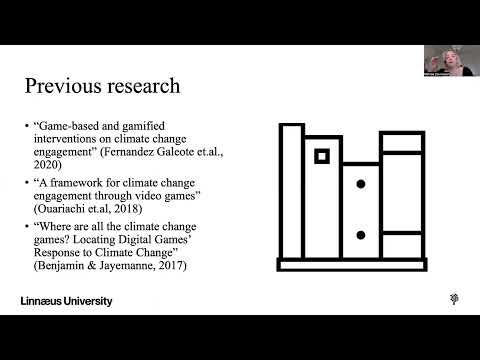 Speaker: Matilda Davidsson @Matilda
Speaker: Matilda Davidsson @Matilda
 Affiliation: Linnaeus University Centre for Intermedial and Multimodal Studies, Sweden
Affiliation: Linnaeus University Centre for Intermedial and Multimodal Studies, Sweden
Title: Playing animal: player experiences of non-human beings and climate emergency futures in video games
Abstract (long version below): Empirical ecocriticism is an emerging field that combines insights from the environmental humanities with methods from environmental communication and the empirical study of literature in order to study the impact of environmental narratives in literature, film, television, video games, and other media on attitudes, emotions, perceptions, and behavior (Małecki, 2019; Schneider-Mayerson, Weik von Mossner, et al., 2020). While still relatively new, the field has already generated significant interest in academia and beyond, with special journal issues and edited collections devoted to it (Schneider-Mayerson et al., 2023), as well as media coverage by the likes of Newsweek or Psychology Today. This interest is mainly due to the exciting output generated by empirical ecocriticism on the potential of stories to move the public on today’s most pressing environmental issues such as climate change, species extinction, and animal welfare (Brereton & Gómez, 2020; Iossifidis & Garforth, 2022; Małecki et al., 2016, 2019; Malecki et al., 2021; Myren-Svelstad, 2023; Sabherwal & Shreedhar, 2022; Schneider-Mayerson, 2018; Schneider-Mayerson, Gustafson, et al., 2020). This symposium focuses on the latter topic, providing new empirical data, both qualitative and quantitative, on the impact of animal stories in video games, literature, and film on perceptions of animals and attitudes toward animal welfare.

 Long abstract
Long abstract
Video games are one of the most popular forms of entertainment in today’s world and a crucial part of digital culture. Empirical methods have been a part of video game studies since its early development in the 1990s. The player holds an important role as the creator of stories in interactive media, and it is thus valuable to investigate player experiences in different ways. During recent years, the influx of media on climate change can also be traced in video games, and the genre of Ecogames or environmentally conscious games are growing. Using qualitative interviews for reception studies, my PhD project investigates player reactions to Ecogames with animal protagonists. In my project I strive to investigate how information about how animals are affected by human actions are portrayed in the games, and perceived by the players. Since every player’s experience is unique, multiple possible interpretations of a game are available. I use a triangulation method of multimodal game analysis combined with qualitative reception studies. I am also interested in online gaming communities and additional contexts that might influence the players.

